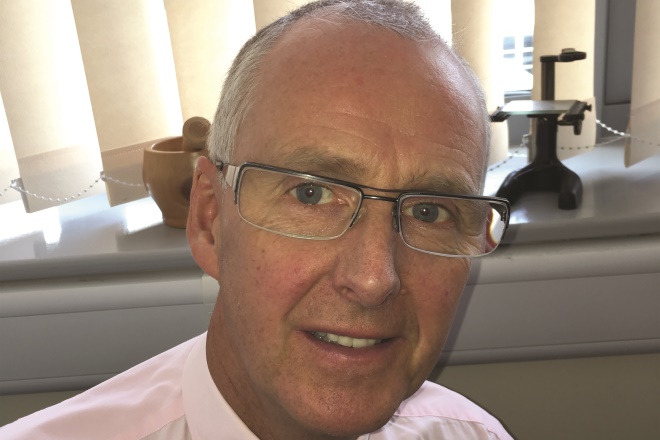
Nigel Ratcliffe
Universities may drop MPharm from their undergraduate programme if they are expected to pick up the bill for student placements as part of a five-year integrated degree, the head of the Pharmacy Schools Council has warned.
Council chair Nigel Ratcliffe criticised the General Pharmaceutical Council (GPhC) for failing to include any funding detail in its consultation on new training and education standards, which opened in January 2019, that could lead to five-year MPharm degrees.
Ratcliffe exclusively told The Pharmaceutical Journal: “It’s an absolute non-starter until we know whether we [universities] are going to be paid to deliver that.
“Vice-chancellors around the country will soon start to question if running a pharmacy degree is a viable option if this extra expense becomes their responsibility.”
The GPhC has proposed replacing current standards for the four-year MPharm and the preregistration year, with a single set of standards that would combine learning outcomes over a five-year period. It says there must be a “much stronger link” between academic study and practical experience, which is currently gained in a preregistration year.
Under the proposals, pharmacy training would have a greater focus on developing pharmacists’ communication and interpersonal skills and pharmacy students would be expected to complete their 52 weeks in the workplace while they are still an undergraduate. How that workplace learning and training is delivered and paid for is not spelt out, although the GPhC says that at least 26 weeks should be delivered in a single placement towards the end of the five years.
Preregistration pharmacists are currently paid a salary by their training provider, which receives a training grant from the NHS towards its costs.
Ratcliffe is the former head of school at Keele University, which has just started to offer an integrated five-year programme and is in the process of being accredited. He said the extra “resources and funding” needed to deliver the new-look degree have been “substantial”.
He reiterated that Pharmacy Schools Council supports the thinking behind the reforms to create a modern pharmacy workforce, but added: “We are professional educators and want to make sure that we meet the [pharmacy] needs of society and the community. But we are also the first group which will have to pick up and implement something that has not necessarily been well thought through.”
Concerns about how the training and learning element of the proposals would be funded have also come from the high street community pharmacy sector.
Marc Donovan, chief pharmacist at Boots, the largest training provider of preregistration pharmacists in the UK, described the GPhC proposals as “the biggest change in pharmacy education and training since the profession moved in the mid-20th century from the apprenticeship route to become a degree-only profession”.
He said: “It has equally large implications for universities, who become responsible for students operating out of day-to-day oversight and employers (training providers), who currently see providing preregistration training as a pipeline for new employees (and subsidise it accordingly).
“Both will be required to make major changes to their administrative infrastructures to cope with this.” He went on to criticise the GPhC consultation document for providing “little clarity on how this would be funded”.
“Clear statements of support by funding authorities and governments are needed. Without funding there is a real risk that these proposals will fail leading to shortages of suitably-trained pharmacists in the medium term,” Donovan added.
Steve Howard, clinical standards director and superintendent pharmacy at LloydsPharmacy parent company McKesson UK, said the pharmacy chain accepted that the degree needed to change to “reflect the evolving roles of pharmacists”, but added that it “also acknowledges that discussions around the renumeration and funding of the proposed changes will need to take place alongside wider discussions around the future of direction of pharmacy”.
According to the GPhC consultation document, only four universities in England currently offer an integrated five-year MPharm degree, which have been designed to accommodate international students who can undertake their preregistration training while still holding a student visa.
When asked about how it expected the training and learning reforms to be funded, the GPhC said in a statement: “At present in England, Health Education England (HEE) and NHS England fund the 52 weeks of training placements, as do their organisational equivalent in the devolved administrations.
“It is too early to say what the funding arrangements would be under the new system. This will depend on the approach adopted by government departments, funding bodies, health education and training bodies and schools of pharmacy.”
Asked by The Pharmaceutical Journal why it had not addressed the funding issue in its consultation document, the GPhC replied: “Our role is to set the standards that we think are needed to make sure future pharmacists are prepared for future practice. It is up to others including government departments, funding bodies, health education and training bodies, schools of pharmacy and employers to work collaboratively and consider what changes may be needed in relation to funding and delivery.”
The GPhC added it would “consider and explore” any challenges in delivering the standards.
“We intend to keep the conversations going to make sure that we can collectively bring about the required developments,” it said.
In January 2019, HEE announced a 25% cut in funding for salary support for preregistration pharmacists being trained in the NHS. Following opposition from chief pharmacists, implementation of the scheme was ‘paused’ so it is now due to come into force in 2021.
The GPhC consultation closes on 3 April 2019.
- This article was amended on 27 March 2019 to clarify that Nigel Ratcliffe is no longer the head of the school of pharmacy at Keele University; he retired in October 2018.


